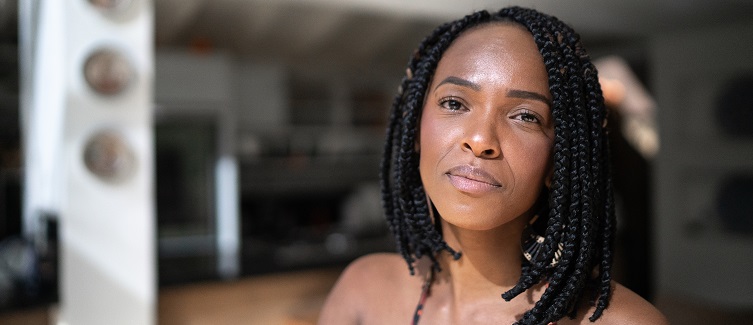Breast cancer is an older person’s diagnosis — right? Not always.
In the U.S. in 2021, approximately 281,550 new cases of invasive breast cancer will be diagnosed in women. An estimated 12,150 cases of those cases will be in women under age 40. Every year, more than 1,000 women under age 40 die from breast cancer.
When breast cancer is diagnosed in young women, it’s shocking and devastating. Young women with breast cancer often face unique challenges and require a different kind of support than older women.
Never Miss a Beat!
Subscribe to Our HealthBeat Newsletter!
Thank you for subscribing!
You can now select the specific newsletters you'd like to receive.
You are already subscribed.
Subscribe to more newsletters in our email preference center.
Sorry, an error occurred. Please try again later.
Get Healthy Tips Sent to Your Phone!
Risk Factors and Detection for Breast Cancer in Young Women
Although cancer in young women is rare, some factors seem to raise the risk of a diagnosis. Some risk factors include:
A history of close family relatives who have been diagnosed with breast cancer.
Previous radiation therapy.
Inherited genetic mutation, often in the BRCA1 or BRCA2 gene.
Early detection is important for any cancer, but because the disease isn’t expected at a young age, it may be overlooked. Younger women may ignore or not look for a lump; however, breast awareness is the best way to find any changes in your body. In fact, nearly 80% of young women diagnosed with breast cancer find their breast abnormality themselves.
Life After Breast Cancer
From differences in treatment options to personal situations, dealing with cancer in your 30s or even 20s can be different than at an older age.
Fertility
Many young women fear chemotherapy and other cancer treatments will affect their ability to become pregnant in the future.
Discuss fertility in detail with your doctor. Chemotherapy can induce menopause, but you have a range of fertility preservation options that may still allow you to start a family after treatment.
Sex and Dating
Whether you’re married or single, having cancer dampens your sex life and can stall your dating life. It’s common to lose interest in sex or to have painful intercourse because of vaginal dryness or other problems caused by treatments. After a mastectomy, women often struggle with body image issues, which may affect their feelings about sexuality.
These challenges are common for women of any age undergoing breast cancer treatment, but may be especially difficult for young women. This is a good time to bond with friends and remain open to dating if you’re single.
No matter your status, there will be different relationship challenges because of your diagnosis. Give it time and seek the support you need to cope with the emotional stress.
Work
In your 20s and 30s, you’re starting and growing your career. Going through treatment doesn’t have to be the end of your career—many patients are able to work through their treatment.
Family
You may still have young children at home that require a lot of your time and energy. You will have to navigate how to talk to your kids about your illness, and you and your spouse may need to redefine roles at home. It’s okay to ask for help from friends, family, and neighbors as you go through treatments.
Coping with Breast Cancer at a Young Age
Having breast cancer at a young age can feel lonely. You will share many of the same struggles as other women going through the same illness, but you’ll also have your own unique challenges.
It also can be tough to make regular conversation at the kids’ soccer games or school events, as other parents have trouble empathizing with what you’re going through. Counseling and support groups, particularly groups aimed at younger cancer patients and survivors, can help you through the difficult times.
Editor's Note: This article was originally published on , and was last reviewed on .
Sources
About UPMC Magee-Womens
Built upon our flagship, UPMC Magee-Womens Hospital in Pittsburgh, and its century-plus history of providing high-quality medical care for people at all stages of life, UPMC Magee-Womens is nationally renowned for its outstanding care for women and their families.
Our Magee-Womens network – from women’s imaging centers and specialty care to outpatient and hospital-based services – provides care throughout Pennsylvania, so the help you need is always close to home. More than 25,000 babies are born at our network hospitals each year, with 10,000 of those babies born at UPMC Magee in Pittsburgh, home to one of the largest NICUs in the country. The Department of Health and Human Services recognizes Magee in Pittsburgh as a National Center of Excellence in Women’s Health; U.S. News & World Report ranks Magee nationally in gynecology. The Magee-Womens Research Institute was the first and is the largest research institute in the U.S. devoted exclusively to women’s health and reproductive biology, with locations in Pittsburgh and Erie.
About UPMC Hillman Cancer Center
When you are facing cancer, you need the best care possible. UPMC Hillman Cancer Center provides world-class cancer care, from diagnosis to treatment, to help you in your cancer battle. We are the only comprehensive cancer center in our region, as designated by the National Cancer Institute. We have more than 70 locations throughout Pennsylvania, Ohio, and New York, with more than 200 oncologists – making it easier for you to find world-class care close to home. Our internationally renowned research team is striving to find new advances in prevention, detection, and treatment. Most of all, we are here for you. Our patient-first approach aims to provide you and your loved ones the care and support you need. To find a provider near you, visit our website.
